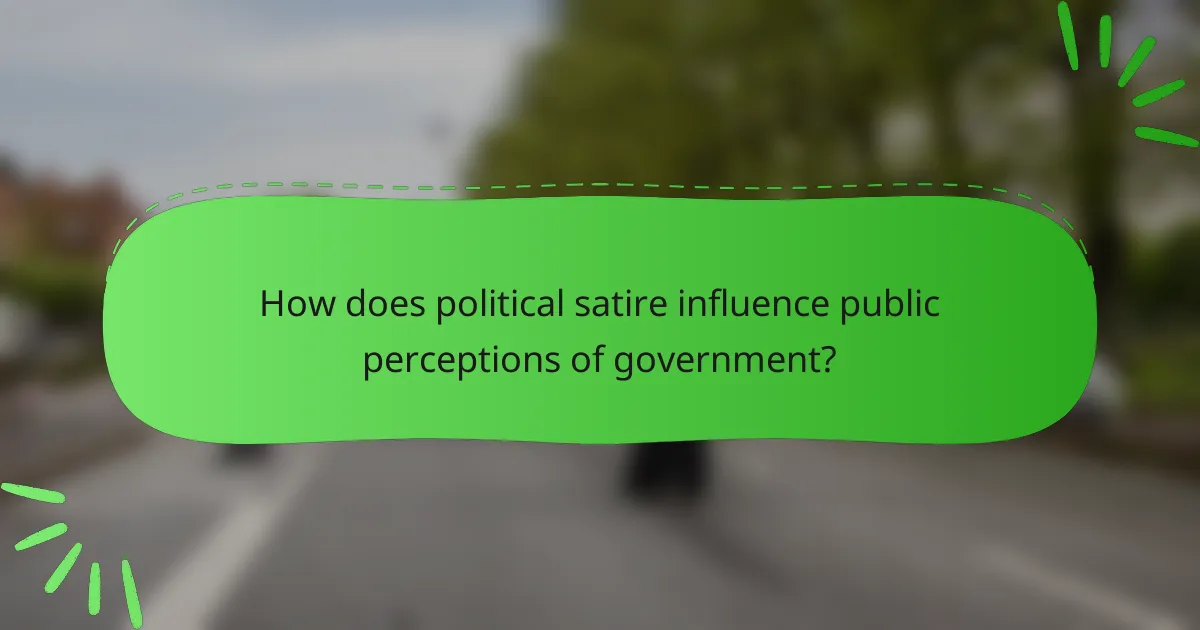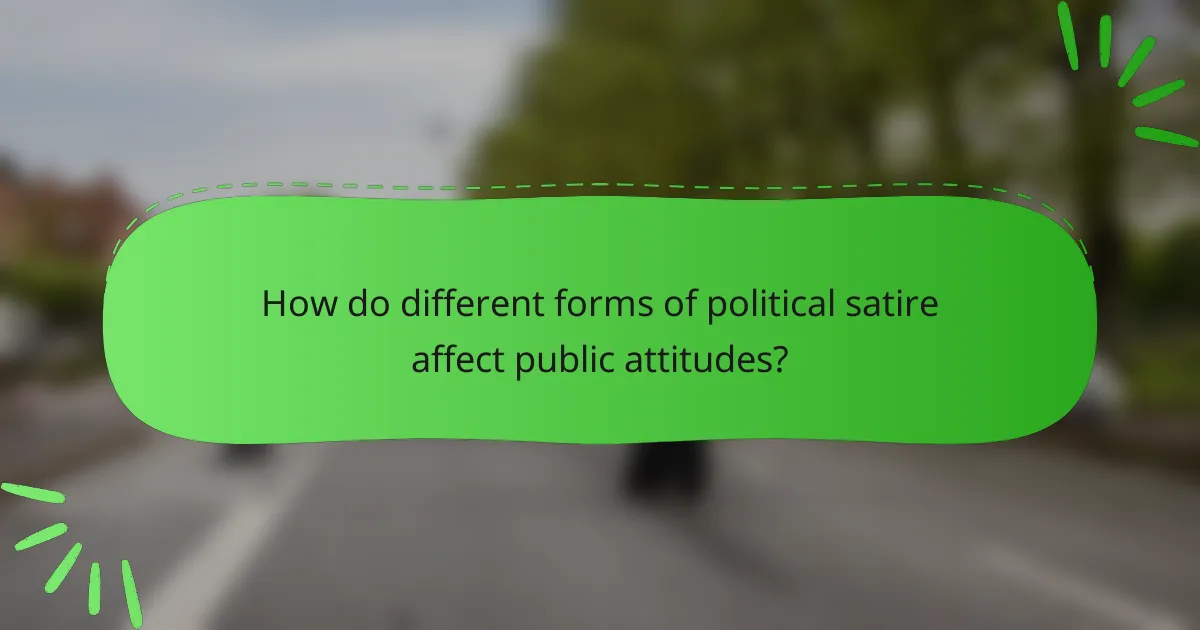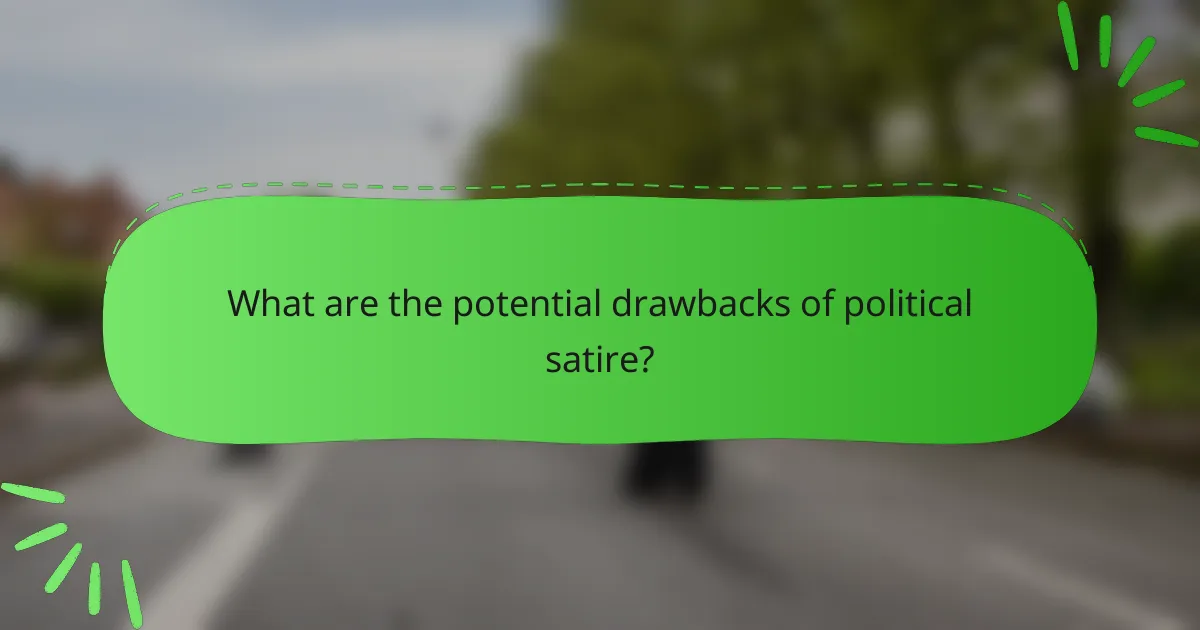Political satire is a form of humor that critiques government actions and figures, significantly impacting public perceptions and engagement with political issues. It simplifies complex topics, making them more accessible, which can lead to increased political discussion and awareness among audiences. Research indicates that exposure to political satire can enhance political knowledge, particularly among younger demographics, while also fostering skepticism towards authority. However, it can also contribute to misinformation, reinforce biases, and deepen political polarization by creating echo chambers. Overall, political satire serves as a critical tool for shaping public sentiment and influencing civic participation.

How does political satire influence public perceptions of government?
Political satire significantly influences public perceptions of government by shaping opinions and providing critical commentary. It often highlights government flaws and absurdities, making them more accessible to the general public. For example, shows like “Saturday Night Live” and “The Daily Show” use humor to critique political figures and policies. Studies indicate that exposure to political satire can increase political engagement and awareness. A 2018 study published in the journal “Political Communication” found that viewers of satirical content were more likely to discuss political issues. This engagement can lead to a more informed electorate. Political satire also fosters skepticism towards government actions, prompting citizens to question authority. Overall, political satire serves as a tool for social commentary, influencing how people perceive government efficacy and integrity.
What are the key elements of political satire?
The key elements of political satire include humor, exaggeration, and criticism. Humor engages the audience and makes complex political issues more accessible. Exaggeration highlights absurdities in political behavior or policies. Criticism targets specific individuals or institutions, prompting reflection on their actions. Satire often employs irony to convey messages indirectly. It uses parody to imitate and mock political figures or events. Additionally, wit sharpens the commentary, making it memorable and impactful. These elements work together to influence public perception and provoke thought about governance.
How does humor play a role in political satire?
Humor serves as a crucial mechanism in political satire by making complex political issues more accessible. It allows audiences to engage with political content in a lighter, more entertaining manner. This engagement can lead to increased awareness and understanding of political topics. Research indicates that humor can lower defenses, making individuals more receptive to critical viewpoints. For example, studies show that satirical content can effectively challenge political beliefs by presenting information in a humorous context. This approach can provoke thought and discussion about government actions and policies. Consequently, humor in political satire can influence public attitudes toward government by encouraging critical reflection.
What techniques are commonly used in political satire?
Political satire commonly employs techniques such as exaggeration, parody, and irony. Exaggeration amplifies traits of political figures or situations to highlight absurdities. Parody mimics the style of a political figure or event to critique it humorously. Irony contrasts expectations with reality, revealing contradictions in political discourse. Satirists often use humor to engage audiences while provoking critical thought. These techniques effectively influence public perception and attitudes towards government actions and policies. For instance, “Saturday Night Live” has used these methods to shape views on various political issues, demonstrating their impact on societal attitudes.
Why is political satire important in a democratic society?
Political satire is important in a democratic society because it fosters critical thinking among citizens. It encourages individuals to question government actions and policies. By using humor, satire makes complex political issues more accessible. This form of expression can highlight societal injustices and political hypocrisy. Historical examples show that satire has influenced public opinion and political change. For instance, satirical programs like “The Daily Show” have increased political engagement among younger audiences. Studies indicate that exposure to political satire correlates with higher voter turnout. Thus, political satire serves as a vital tool for democracy by promoting informed citizenship.
How does political satire promote civic engagement?
Political satire promotes civic engagement by encouraging critical thinking about political issues. It uses humor to highlight societal problems and governmental shortcomings. This approach makes complex topics more accessible to the public. Audiences are more likely to discuss and reflect on these issues after engaging with satire. Studies show that exposure to political satire increases political knowledge and awareness. For example, research by the Pew Research Center indicates that satirical content can motivate individuals to participate in political discussions. Additionally, satirical programs often encourage viewers to vote or engage in activism. This interaction fosters a more informed and active citizenry.
What impact does political satire have on voter behavior?
Political satire significantly impacts voter behavior by shaping perceptions of candidates and issues. It often increases political engagement among audiences. Research indicates that exposure to political satire can enhance understanding of complex political topics. For instance, a study by the Pew Research Center found that 60% of young adults were more likely to discuss political issues after viewing satire. Additionally, satire can influence voter turnout by motivating individuals to participate in elections. The humorous critique often resonates with younger voters, making them more likely to vote. Overall, political satire serves as a tool for political socialization and mobilization.

How do different forms of political satire affect public attitudes?
Different forms of political satire significantly influence public attitudes by shaping perceptions of political figures and issues. Satire can enhance political engagement by making complex topics more accessible. For example, television shows like “Saturday Night Live” often use humor to critique government actions, leading to increased public discussion. Research indicates that audiences exposed to political satire demonstrate higher levels of political knowledge and awareness. A study by the Pew Research Center found that satirical content can shift public opinion, especially among younger demographics. Moreover, satirical memes on social media can rapidly spread critical views, impacting collective attitudes toward governance. Thus, political satire functions as a powerful tool for shaping public sentiment and encouraging civic participation.
What are the various platforms for political satire?
Various platforms for political satire include television shows, online videos, social media, podcasts, and print media. Television shows like “Saturday Night Live” and “The Daily Show” use humor to critique politicians and policies. Online video platforms, such as YouTube, host satirical content from creators like John Oliver and Hasan Minhaj. Social media platforms like Twitter and Facebook allow users to share and create satirical memes and posts quickly. Podcasts dedicated to political humor, such as “Pod Save America,” engage audiences with satire in an audio format. Print media, including satirical magazines like “The Onion” and “Mad Magazine,” provide written commentary on political issues. Each platform has a unique audience and style, contributing to the broader landscape of political satire.
How do television shows contribute to political satire?
Television shows contribute to political satire by using humor to critique political figures and policies. They often present exaggerated portrayals of politicians, highlighting their flaws and contradictions. This form of satire engages audiences, making complex political issues more accessible. Shows like “Saturday Night Live” and “The Daily Show” have a history of influencing public opinion. Studies show that viewers of political satire are more informed about current events. These shows can also encourage critical thinking and skepticism towards government actions. By blending entertainment with political commentary, television shows play a significant role in shaping public attitudes towards government.
What role do social media and online content play in shaping satire?
Social media and online content significantly influence the creation and dissemination of satire. They provide platforms for immediate sharing and engagement, allowing satirical content to reach wider audiences rapidly. This accessibility enables diverse voices and perspectives to participate in satirical discourse.
Moreover, social media algorithms often prioritize engaging content, which can amplify the reach of satirical posts. Studies show that satirical content shared on platforms like Twitter and Facebook can shape public perceptions and attitudes towards political issues. For instance, a 2020 study published in the journal “Political Communication” found that exposure to political satire on social media increased political engagement among younger audiences.
Additionally, online content allows for real-time responses and adaptations of satire, making it more relevant to current events. This dynamic nature of social media fosters a participatory culture where audiences can interact with and contribute to satirical narratives.
How does the audience’s background influence their reception of political satire?
The audience’s background significantly influences their reception of political satire. Factors such as education level, cultural context, and political affiliation shape how individuals interpret humor. For example, individuals with higher education levels may understand complex references in satire better than those with less education. Cultural context also plays a role; satire that resonates in one culture may not translate well to another. Political affiliation can create biases, leading audiences to reject satire that critiques their preferred party. Research shows that audiences often respond more positively to satire that aligns with their beliefs. This alignment fosters a sense of validation and connection. Conversely, satire opposing one’s views may be dismissed or misunderstood. Thus, the audience’s background is crucial in determining their engagement with political satire.
What demographic factors affect how satire is interpreted?
Demographic factors such as age, education level, and cultural background significantly affect how satire is interpreted. Younger audiences often have a different sense of humor compared to older generations. This difference can lead to varying interpretations of satirical content. Education level influences critical thinking skills, which can affect the understanding of nuanced satire. Cultural background shapes perspectives and references that are essential for interpreting satire. For example, individuals from different cultures may not share the same contextual knowledge that satire relies on. Additionally, political affiliation can influence how satire is received and understood. Research indicates that individuals with differing political views may interpret the same satirical content in contrasting ways, affecting their overall perception of the message.
How do cultural contexts shape the understanding of political satire?
Cultural contexts significantly shape the understanding of political satire. Different societies have unique historical, social, and political backgrounds that influence how satire is perceived. For example, in countries with a history of authoritarianism, satire may serve as a critical tool for resistance. This resistance can be seen in the works of satirists like Jonathan Swift, who used satire to critique political corruption in 18th century England.
Moreover, cultural norms dictate what is considered acceptable humor. In some cultures, direct criticism of leaders may be taboo, while in others, it is celebrated. A study by The International Journal of Communication highlights that cultural attitudes towards authority affect the reception of satirical content.
Additionally, language plays a crucial role in satire. The nuances of language can change the meaning of jokes, making them more or less effective depending on cultural context. For instance, puns and wordplay may resonate differently across languages and cultures.
Thus, cultural contexts not only influence the content of political satire but also its interpretation and impact on audiences.

What are the potential drawbacks of political satire?
Political satire can lead to misinformation and misunderstanding of political issues. It often simplifies complex topics, which can mislead audiences. This oversimplification may result in a lack of informed debate among the public. Additionally, satire can reinforce existing biases rather than challenge them. When audiences only engage with content that aligns with their views, it creates echo chambers. This phenomenon can deepen political polarization. Furthermore, satire may desensitize viewers to serious political issues. Audiences might dismiss significant matters as mere jokes. Research indicates that exposure to political satire can diminish the perceived importance of civic engagement.
How can political satire lead to misinformation?
Political satire can lead to misinformation by distorting facts for comedic effect. Satirical content often exaggerates or misrepresents political events or figures. Audiences may interpret these exaggerated portrayals as factual, especially if they lack background knowledge. Research shows that people are more likely to remember the satirical narrative than the actual event. This cognitive bias can reinforce misconceptions about political issues. A study by the Pew Research Center found that 70% of Americans believe satire reflects the truth about politicians. Thus, satire can blur the line between humor and reality, resulting in the spread of misinformation.
What are the risks of misunderstanding satirical content?
Misunderstanding satirical content can lead to significant misinterpretations of the intended message. Satire often employs exaggeration and irony to critique or comment on social and political issues. When audiences fail to recognize these elements, they may take the satire literally. This can result in confusion about the actual stance of the satirist. Additionally, individuals may form misguided opinions based on misinterpretations. Research indicates that audiences with lower media literacy are more susceptible to these misunderstandings. For instance, a study by the Pew Research Center found that misinterpretation of satire can lead to polarized views on political issues. Ultimately, these risks can distort public perceptions and influence attitudes towards government.
How does political satire contribute to polarization?
Political satire contributes to polarization by reinforcing existing biases and dividing audiences along ideological lines. It often exaggerates the flaws of opposing viewpoints, leading to stronger in-group and out-group identities. Research shows that individuals who consume political satire are more likely to adopt polarized opinions. A study by the Pew Research Center found that satirical content can deepen partisan divides by framing issues in a way that resonates with specific political beliefs. This selective exposure to satire creates echo chambers, where individuals are less likely to encounter opposing perspectives. Consequently, political satire can amplify emotional responses, making compromise and dialogue more difficult.
What strategies can be employed to enhance the positive impact of political satire?
Employing strategies such as promoting critical thinking, targeting misinformation, and fostering inclusivity can enhance the positive impact of political satire. Critical thinking encourages audiences to analyze and question political narratives. This approach helps individuals discern facts from satire. Targeting misinformation ensures that satire addresses false claims directly. This can clarify issues and promote informed discussions. Fostering inclusivity in satire broadens perspectives. It allows diverse voices and experiences to be represented. This representation can resonate with a wider audience. Engaging with current events ensures relevance. Timely satire can provoke immediate reactions and discussions. Utilizing social media platforms amplifies reach. This method enhances the visibility of satirical content. Overall, these strategies can strengthen the role of political satire in shaping public attitudes towards government.
How can creators balance humor and accuracy in political satire?
Creators can balance humor and accuracy in political satire by focusing on factual content while employing comedic techniques. They should base their satire on verified information and current events. This ensures that the humor does not distort the truth. Utilizing exaggeration or absurdity can highlight real issues without misrepresenting facts. Research shows that audiences appreciate humor that is rooted in reality, as it enhances relatability. For example, satirical shows like “The Daily Show” often fact-check their content to maintain credibility. Balancing these elements fosters trust and encourages critical thinking among viewers.
What best practices should be followed when consuming political satire?
When consuming political satire, it is essential to approach it with a critical mindset. Analyze the underlying messages and the context in which the satire is presented. Recognize that satire often exaggerates or distorts facts for comedic effect. Verify claims made in the satire by consulting reputable sources. Understand the satirist’s perspective and potential biases. Engage in discussions with others to gain diverse viewpoints. Balance satire consumption with factual news to maintain an informed perspective. Lastly, be aware of the emotional responses satire can provoke and reflect on your reactions.
The main entity of the article is political satire and its influence on public attitudes towards government. The article explores how political satire shapes perceptions by using humor, exaggeration, and criticism to engage audiences and provoke critical thinking about governance. It discusses key elements and techniques of satire, its role in promoting civic engagement, and the impact on voter behavior. Additionally, the article addresses potential drawbacks, such as misinformation and polarization, while suggesting strategies for enhancing the positive effects of political satire on public discourse.